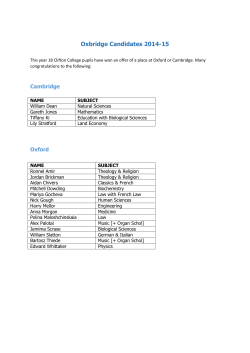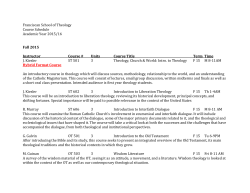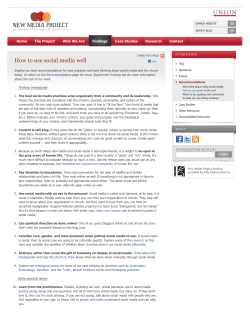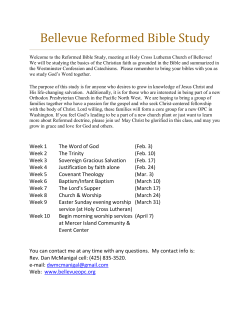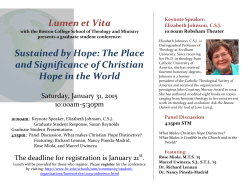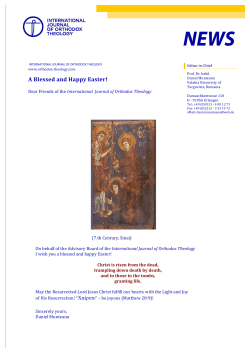
0ST522 - Reformed Theological Seminary
RTS D I S TA N C E E D U C AT I O N Systematic Theology III 0ST522, 3 Hours Lectures by Douglas F. Kelly, Ph.D. RTS Distance Education This course notebook is for the coordination of your course materials, including reading assignments and lecture recordings. Each course notebook for RTS Distance Education is arranged by the GUIDE acronym. The five components of GUIDE are organized in each lesson by the following steps in the notebook: GUIDE Getting Started To do the lessons, reading and listening assignments are listed. Understanding To maximize learning, the purposes are given. Investigating To explore the content, outlines are provided for note taking. Developing To expand content, readings are suggested. Evaluating To help review, lesson questions are based on purposes. ii Systematic Theology III - Dr. Douglas F. Kelly © 2014 - Reformed Theological Seminary, Distance Education COURSE SYLLABUS Systematic Theology III, 0ST522 3 hours Lecturing Professor: Dr. Douglas F. Kelly Professor of Record: Dr. Scott Swain Reformed Theological Seminary, Distance Education Lecturing Professor Dr. Douglas Kelly is a scholar marked by profound piety as exemplified in volumes such as If God Already Knows, Why Pray? and Preachers with Power: Four Stalwarts of the South. His firm grasp of multiple languages and his theological competence are capably demonstrated in translating such works as Sermons by John Calvin on II Samuel. He is serving with David Wright of the University of Edinburgh as a general editor for a revision of Calvin’s Old Testament Commentaries. In addition, he is co-editor for a twenty volume dogmatics series, for which he is writing a volume on the Trinity. He has written Creation and Change: Genesis 1.1 - 2.4 in the Light of Changing Scientific Paradigms and Carolina Scots: An Historical and Genealogical Study of Over 100 Years of Emigration, and is currently writing a systematic theology. Professor of Record Scott R. Swain joined the faculty of Reformed Theological Seminary in 2006. Prior to that, he taught theology at Trinity Evangelical Divinity School in Deerfield, Illinois and served on the faculty of Southwestern Baptist Theological Seminary in Fort Worth, Texas. He currently serves as Associate Professor of Systematic Theology and Academic Dean on the Orlando campus. In his teaching and research, Dr. Swain seeks to retrieve the riches of patristic, medieval, and Reformation patterns of biblical interpretation and theologizing for the sake of the contemporary church’s renewal according to the Word of God. With Michael Allen, he edits two series that endeavor to embody a theology of “renewal through retrieval”: Zondervan Academic’s New Studies in Dogmatics and T & T Clark’s International Theological Commentary. Dr. Swain’s main research interests include the doctrine of God and the theological interpretation of Scripture. At present, he is working on a book on the divine names. Dr. Swain is an ordained minister in the Presbyterian Church in America. He and his wife, Leigh, have four children. iii Systematic Theology III - Dr. Douglas F. Kelly © 2014 - Reformed Theological Seminary, Distance Education Course Description The purpose of this course is to study the topics of: Christology, Christ and His Work; Soteriology, the area of sin and salvation; and Eschatology, the end times. This is the continuation of the courses Systematic Theology I and II. Of special concern are the sub-topics of: the doctrine of the covenant; the covenant concept in biblical context; the doctrine of the atonement; effectual calling, justification, and adoption; the doctrine of sanctification; Christian liberty; the nature of faith; the work and doctrine of the Holy Spirit; Christ’s return and future judgement. Course Objectives To familiarize the student with the theological categories of Christology, Soteriology, and Eschatology: • For Christology, to introduce the doctrines of incarnation, the hypostatic union, and Christ’s humiliation and exaltation. • For Soteriology, to outline and explain the Ordo Salutis; included in this are discussions on the union of Christ with his people, the nature of effectual calling and regeneration, and perseverance of the saints. • For Eschatology, to understand the exegetical basis and theological implications of Last Things; included in this are discussions of death, the intermediate state, the final rest, the final condemnation, and the Return of Christ. Required Textbooks The Bible Berkhof, Louis. Systematic Theology. Grand Rapids, MI: Wm B. Eerdmans Publ. Co., 1996. Calvin, John. Institutes of the Christian Religion. Grand Rapids, MI: Wm B. Eerdmans Publ. Co., 1975. Murray, John. Redemption Accomplished and Applied. Grand Rapids, MI: Wm .B. Eerdmans Publ. Co., 1992. Torrance, Thomas F. Incarnation: The Person and Life of Christ. ed. Robert T. Walker. Downers Grove, IL: IVP Academic, 2008. The Westminster Confession of Faith. Greenwood, SC: The Attic Press, Inc., 1979. All required books are available through the RTS Online Bookstore at <www.rts.edu/bookstore>. iv Systematic Theology III - Dr. Douglas F. Kelly © 2014 - Reformed Theological Seminary, Distance Education COURSE REQUIREMENTS Systematic Theology III, 0ST522 3 hours Lecturing Professor: Dr. Douglas F. Kelly Professor of Record: Dr. Scott Swain Reformed Theological Seminary, Distance Education Online Student Handbook The Online Student Handbook has been designed to assist you in successfully navigating the online Distance Education experience, whether you are taking a single course or pursuing a certificate or degree program. In it you will find valuable information, step-by-step instructions, study helps, and essential forms to guide you through every aspect of your distance education opportunity from registration to graduation. Please use this resource as your first-stop reference manual. You will find it located at the RTS Distance Education website (www.rts.edu/distance) under the Student Services tab. Summary of Requirements • Follow the Study Guide provided. • Listen to all Recorded Lectures. • Complete all Readings. • Participate in Forum Discussions (with other students and Professor) • Take the Mid Term Exam • Take the Final Exam. • Write a Course Paper • Submit Mentor Report/Course Application Paper Forum Discussions (15%) The student is required to interact in two (2) forums: 1. Student-Professor Posts (15 total posts) A. Personal Introduction Forum: The student is required to post a brief personal introduction to the professor/class. Suggested details include your vocation, where you live, your church background, why you chose RTS, and what you hope to gain through the course (1 required post). B. 5 Topical Discussion Q&A Forums: The student is required to answer each topical discussion question with one (1) response. The professor will acknowledge the student’s answer and will follow up with a subsequent question to which the student must also answer with one (1) response. Each topical discussion question therefore requires two (2) total posts/responses from the student (Total of 5 forums x 2 posts =10 total posts). C. Student-Professor Forum: The student is required to post four (4) times in this forum. Posts in this forum should focus on course-related content such as research paper topics, lectures and reading assignments, or other academic issues related to the course. 2. Student-Student Forum (5 total posts) • A post may be either a new topic or a response to an already existing topic. v Systematic Theology III - Dr. Douglas F. Kelly © 2014 - Reformed Theological Seminary, Distance Education Examinations (Midterm 25%, Final 25%) There are two examinations for this course. The midterm examination will cover all the lectures and readings from Lessons 1-8. The final examination will cover all the lectures and readings from Lessons 9-17. The midterm and final exams for this course are to be taken online in the Learning Management System (LMS). Please note that you will need to have a proctor for your exams. Your proctor can be anyone except a relative or current RTS Student. After clicking on the exam link you will be given detailed instructions about the exam. Please read these instructions carefully before entering the exam. Research Paper (30%) See section titled “Research Paper” for a description and requirements of the research paper. Mentor Report / Course Application Paper (5%) Each Global/Non-Residential student is required to have a mentor submit a report at the end of the course. This report will contribute to 5% of the student’s grade. For students who are not Global/Non-Residential, you are asked to write a 200 word summary of how you perceive what you have learned in this course will fit into the objectives you have for your ministry, your educational goals, or other objectives you wish to achieve in life. Assignments Best practice for your time management is for you to submit all assignments at the end of the week in which they fall in the LMS, using the upload links provided. All work must be submitted by midnight of the course end date, per your course start letter. You are responsible for turning in all assignments on time; no late submissions are permitted. Any student who needs an extension must get approval from the Registrar prior to that time. Contact Information Reformed Theological Seminary, Distance Education 2101 Carmel Road Charlotte, NC 28226 (704) 900-1257 1-855-854-6920 FAX: (704) 366-9295 E-mail: dess@rts.edu Web site: www.rts.edu/distance vi Systematic Theology III - Dr. Douglas F. Kelly © 2014 - Reformed Theological Seminary, Distance Education STRUCTURE OF THE COURSE: Systematic Theology III, 0ST522 3 hours Lecturing Professor: Dr. Douglas F. Kelly Professor of Record: Dr. Scott Swain Reformed Theological Seminary, Distance Education Lectures and readings will deal with three major topics: 1. CHRISTOLOGY We study the person and work of Christ based on exegesis of Scripture with reference to relevant historical church councils and confessions. 2. SOTERIOLOGY We study the application of Christ’s work of redemption, the order of salvation and its benefits. We shall survey the exegetical basis and theological implications of: • • • • • • • • • Union with Christ Calling Regeneration Conversion Faith Justification Adoption Sanctification Perseverance 3. ESCHATOLOGY We study the exegetical basis and theological implications of the doctrine of Last Things, including: • • • • • Death The intermediate state The return of Christ The resurrection The final judgment vii Systematic Theology III - Dr. Douglas F. Kelly © 2014 - Reformed Theological Seminary, Distance Education RESEARCH PAPER Systematic Theology III, 0ST522 3 hours Lecturing Professor: Dr. Douglas F. Kelly Professor of Record: Dr. Scott Swain Reformed Theological Seminary, Distance Education Assignment Choose one topic from among the following topic options. Write a 12-15 page paper, utilizing the theological categories presented in this course and demonstrating from how scripture bears upon your subject. Significant interaction with course lectures, notes, and reading is encouraged insofar as they relate to your topic Your paper should be 12 pt. font and double spaced, formatted according to Turabian style with single spaced 10 pt. font footnotes (not endnotes) and a properly formatted bibliography at the end. Please make sure that your paper has in the first paragraph a clearly presented thesis statement defining the aim and scope of the paper. In addition, your paper should cite at least 8 scholarly sources; 2 of these sources must be academic journal articles. For the purposes of this paper, a scholarly source is a book or article by a recognized expert in the field, not aimed at a popular level for a general audience (Wikipedia is not a scholarly source, but may be useful in locating scholarly sources.). Please consult student services (dess@rts.edu) if you have any doubts about whether a source is scholarly. It is highly recommended that the student: • View the Reading and Writing Tips videos before starting their research paper. These videos can be accessed on the course home page by clicking on the light bulb icon labeled Tips. • Read the Research Paper Formatting Guide document found under Modules in the Course Resources Section. • Access the Research Paper Helps page found under Modules in the Course Resources Section. • Use the Historical Theology Sample Paper as a guide for formatting and writing with a clear thesis. This can be found under Modules in the Course Resources Section. • Discuss with the Professor of Record (by phone, forums, video conference, etc.) their paper topic prior to writing, as the professor of record will be able to guide the student in their writing and help with recommending resources. (For further help with tracking down and acquiring resources please contact the Distance Education librarian David Ponter. His contact information can be found in the Research Paper Helps page.) Choose from one of the topics below: 1. The Person of Christ in biblical perspective: One of the most promising developments in New Testament studies is the “Early High Christology” movement. Major players in this movement include Richard Bauckham and Larry Hurtado. Engage this movement, or one of its proponents, discussing both its potential contributions and shortcomings for developing a biblical understanding of the Person of Christ. viii Systematic Theology III - Dr. Douglas F. Kelly © 2014 - Reformed Theological Seminary, Distance Education 2. The doctrine of justification: In recent years, certain Protestant scholars and pastors have challenged the traditional Protestant doctrine of justification, suggesting that the Reformers misunderstood Paul’s teaching on this topic. Engage one of these contemporary critics (e.g., N. T. Wright, James D. G. Dunn, a proponent of the “Federal Vision”) and respond to their criticisms in light of biblical exegesis and the Reformed confessions. 3. The nature of hell: Contemporary evangelicals continue to debate both the possibility and nature of eternal punishment. Debated questions include: Who goes to hell, if anyone? How does our understanding of hell relate to our understanding of God’s love and of Christ’s atoning work? What is the nature of hell? Does hell involve eternal conscious punishment? Or does hell simply annihilate unbelievers? ix Systematic Theology III - Dr. Douglas F. Kelly © 2014 - Reformed Theological Seminary, Distance Education COURSE OUTLINE Systematic Theology III, 0ST522 3 hours Lecturing Professor: Dr. Douglas F. Kelly Professor of Record: Dr. Scott Swain Reformed Theological Seminary, Distance Education Lesson One Old Testament Preparation for the Incarnation and The Names of Christ Lesson Two Important Passages on the Incarnation Lesson Three The Hypostatic Union Lesson Four The Patristic Doctrine of Christ Lesson Five The Reformed Doctrine of Christ Lesson Six The States of Christ Lesson Seven Union With Christ Lesson Eight Calling Lesson Nine Regeneration Part One Lesson Ten Regeneration Part Two Lesson Eleven Conversion Lesson Twelve Faith Lesson Thirteen Justification x Systematic Theology III - Dr. Douglas F. Kelly © 2014 - Reformed Theological Seminary, Distance Education Lesson Fourteen Sanctification Lesson Fifteen Adoption Lesson Sixteen Perseverance of the Saints Lesson Seventeen Eschatology xi Systematic Theology III - Dr. Douglas F. Kelly © 2014 - Reformed Theological Seminary, Distance Education REFORMED THEOLOGICAL SEMINARY SYSTEM Course Objectives Related to MAR Student Learning Outcomes Course: Systematic Theology III Professor: Dr. Douglas Kelly Rubric Mini-Justification Strong Significant knowledge of the original meaning of Scripture. Also, the concepts for and skill to research further into the original meaning of Scripture and to apply Scripture to a variety of modern circumstances. (Includes appropriate use of original languages and hermeneutics; and integrates theological, historical, and cultural/global perspectives.) Students will demonstrate knowledge of the material by the completion of several précis assignments and an outline of the Confession of Faith; a cumulative final exam will measure student mastery of the concepts. Strong The students will argue from and prove doctrines using Scripture; the student will integrate the application of Scripture to modern circumstances throughout the course. Significant knowledge of Reformed theology and practice, with emphasis on the Westminster Standards. Strong MAR Student Learning Outcomes Ø Strong Ø Moderate Ø Minimal Ø None In order to measure the success of the MAR curriculum, RTS has defined the following as the intended outcomes of the student learning process. Each course contributes to these overall outcomes. This rubric shows the contribution of this course to the MAR outcomes. Articulation (oral & written) Scripture Reformed Theology Broadly understands and articulates knowledge, both oral and written, of essential biblical, theological, historical, and cultural/ global information, including details, concepts, and frameworks. Sanctification Demonstrates a love for the Triune God that aids the student’s sanctification. Desire for Worldview Winsomely Reformed/ Evangelistic Teach Church/World Strong Burning desire to conform all of life to the Word of God. Strong Embraces a winsomely Reformed ethos. (Includes an appropriate ecumenical spirit with other Christians, especially Evangelicals; a concern to present the Gospel in a Godhonoring manner to non-Christians; and a truth-in-love attitude in disagreements.) Strong Ability to teach the meaning of Scripture to both heart and mind with clarity and enthusiasm. Moderate Ability to interact within a denominational context, within the broader worldwide church, and with significant public issues. Moderate By the completion of the Systematic Theology courses, the student will have a solid foundation and introduction to Reformed Theology as articulated in the Westminster Confession and Catechisms. In addition to a discussion of the interplay between Grace and Obedience in the Christian life, the student will be exhorted to persevere in the grace that saved him. We engage in the “science of living blessedly forever;” through the study of God’s word, the student will know how better to apply the Word of God to the world of the 21st Century The Gospel of Jesus Christ, rightly understood, leads those who have been transformed by it, to proclaim it; the Systematic Theology courses are designed so that the student attains a right understanding of that gospel. This course aims to help the man of God rightly apply and divide the word of truth by studying the God who gave us His Scripture. While ecclesiology is covered a different course, proper theology is essential for good and right doxology. xii Systematic Theology III - Dr. Douglas F. Kelly © 2014 - Reformed Theological Seminary, Distance Education
© Copyright 2025

